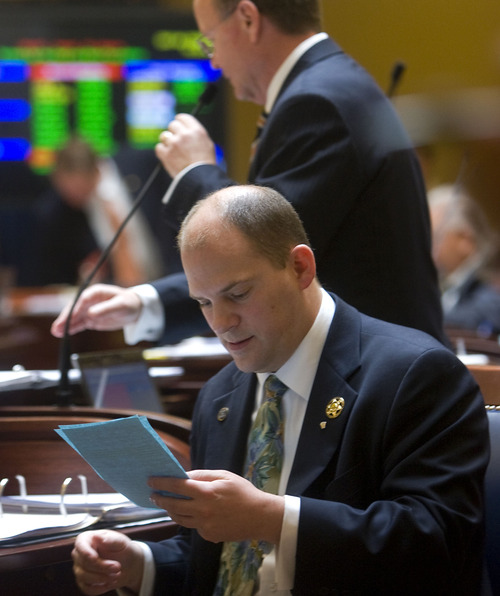This is an archived article that was published on sltrib.com in 2014, and information in the article may be outdated. It is provided only for personal research purposes and may not be reprinted.
A man walked out of a mall store to answer a cellphone call, forgetting the software in his hand, and ended up spending nine months in prison.
When he was in high school, he twice had shoplifted. Though he had straightened out, the incident was his third strike, and he was charged with a felony.
Sen. Daniel Thatcher, R-West Valley City, is calling for leniency in such situations.
He is sponsoring a bill this year that would change the three strikes law to four: your third misdemeanor-level theft is a class-A misdemeanor, instead of the felony, which would be reserved for your fourth theft.
Salt Lake County District Attorney Sim Gill's prosecution office, as well as other county attorneys, have been working with Thatcher on the bill. Gill likes the proposal, since for some reason, data shows that the graduated approach actually seems to deter people more effectively than an abrupt one, as it gives the defendant one more chance to do better.
The legislation does come with a few caveats: it does not apply to people who already have felonies in their past, if either of the prior thefts was a class-A misdemeanor, or to any theft of more than $500. Thatcher's bill is not intended for habitual or violent offenders — the point is to slow down the progression from three months for a theft to five years for the same crime. Though it's official title is SB13, Thatcher calls it his "Jean Valjean law," after the "Les Miserables" protagonist sentenced to five years' imprisonment for stealing a loaf of bread.
"Most prosecutors are not interested in overcharging … But some prosecutors will look for a way to use leverage to make someone confess," Thatcher said. Some lawyers will tell defendants that they might as well plead to a reduced class-A misdemeanor so the case resolves without going to court, where if they fight the charge, they could face up to several years in prison, Thatcher said.
Valjean's fate could have befallen Daniel Snyder. In 2010, the 20-year-old's coworkers at an Ogden Jiffy Lube gave him $5 to buy them lunch, according to the Standard-Examiner. But the police say that Snyder walked out of an adjacent grocery store with six corndogs without paying for them.
Even though the corndogs were only worth $4.74, Snyder had been convicted in 2009 on two charges of misdemeanor theft, so this third time made the shoplifting a felony. He tried fighting it, but he was found guilty.
His charge was eventually reduced to a class-A misdemeanor last July — after he completed probation, according to court documents.
"People say 'I don't understand why you're so soft on crime.' I'm not," Thatcher said. "I just think we should be reasonable."
The Utah Commission for Criminal and Juvenile Justice recently studied how many times people are convicted on the three strikes law — turns out, it's rare. But Thatcher is not deterred. "Even if it happens to one person, it's terrible," he said.
Thatcher related how last year, he was in line for food at the Utah State Capitol cafeteria and talking about the issue when one of the food servers got his attention and told Thatcher about his younger brother— the man who served nine months for the mall theft.
"You would think a prosecutor would drop this case or not push for a third-degree felony conviction," Thatcher said. "The guy ended up being told by his public defender [to either] take a year, or if we gamble [in court] you might get three."
When Thatcher tried to push the same bill during the last session, he pointed out to a senate committee the life-altering ramifications of a felony conviction on someone's record: they lose the right to vote, to carry a firearm and "frankly, good luck getting a job."
"Jean Valjean bill" came quite close to becoming law last year. It coasted through with nearly unanimous approval. Only one senator voted against it when it was in committee. But on the final night of the session, Thatcher said it barely missed the deadline for final approval in the Senate before the clock struck midnight.
Twitter: @mikeypanda



